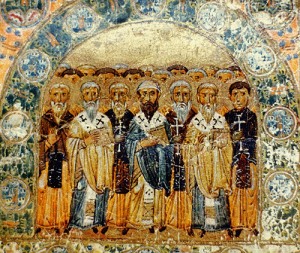 People who love their enemies and do good to those who hate them will be children of God! The blessed Apostle reveals the reward these children of God are to receive:
People who love their enemies and do good to those who hate them will be children of God! The blessed Apostle reveals the reward these children of God are to receive:
The Spirit himself bears witness to our spirit that we are children of God. But if we are children then we are heirs as well: heirs of God and co-heirs with Christ.
Pay heed, then, Christians; pay heed, children of God; pay heed, heirs of God and co-heirs with Christ: If you wish to receive your patrimony, love not only your friends but also your enemies.
Deny no one the love which all the righteous have as a common possession. Let everyone have it at once, and so that you may have it more fully, bestow it upon good and bad alike.
Such a sharing of good things in common is by no means an earthly virtue: it is heavenly. There is therefore nothing in it to restrict those who share in it.
Love increases as cupidity decreases; moreover, love never fails to free those whom worldly desires do not hold captive.
Love is a gift of God. As the Apostle says: God’s love has been poured into our hearts through the Holy Spirit who has been given to us.
Avarice is a snare of the devil, and not only a snare but a sword: by means of it he captures poor wretches and puts them to death.
Love is the root of all good; avarice is the root of all evil. Avarice brings ceaseless torment because it is never satisfied with its booty. Love, on the other hand, brings joy because the more it increases the more generously it gives.
Consequently, while their acquisitions impoverish those who desire evil, charitable givers are enriched by their gifts. The greedy are troubled, seeking revenge for injuries inflicted on them; the charitable are at peace, delighting to forgive any harm done to them.
The avaricious avoid practising the works of mercy, while the charitable perform them cheerfully The object of the avaricious is to injure their neighbours; the charitable do them no harm. By self-exaltation the greedy sink down into hell; by humbling themselves the charitable ascend to heaven.
But when shall I ever be able fittingly to sing the praises of love, which is not solitary in heaven or bereft on earth? For on earth it is fed by the words of God; in heaven it is filled by the words of God.
On earth it has the company of friends, in heaven the fellowship of angels. It toils in the world; it finds rest in heaven.
Fulgentius of Ruspe (462/467—527/533): Sermon 5.5-6 (CCL 91A:922-923); from the Monastic Office of Vigils, Tuesday of the 25th Week of Ordinary Time, Year 1.








